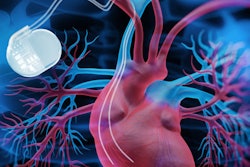
Patients with implantable electronic cardiac devices need not worry about their MRI scan, even for chest imaging, according to a study published online September 28 in the Journal of Cardiovascular Electrophysiology.
Researchers from the Intermountain Medical Center Heart Institute in Salt Lake City analyzed 212 MRI studies from 178 patients with a total of 418 implanted leads. They were unable to find any problems or cases where action was needed for an adverse reaction between February 2014 and August 2016 (J Cardiovasc Electrophysiol, September 28, 2017).
The results confirm research published in the New England Journal of Medicine in February 2017 that indicated implantable cardiac devices might be safer in the MRI environment than previously thought. The MagnaSafe Registry study included more than 1,000 patients who received nonthoracic scans. The researchers also found no device or lead failures, even with devices that were not certified for use with MRI.
The Intermountain researchers noted, however, that the MagnaSafe Registry study looked at the safety of MRI only in parts of the body not in direct proximity to the implantable cardiac rhythm devices, which typically are implanted in the chest under one of the collarbones.
"The recent MagnaSafe Registry demonstrated safety of nonthoracic magnetic resonance imaging (MRI) with nonconditional cardiac implantable electronic devices," wrote senior author Dr. Jeffrey L. Anderson and colleagues in the current paper. "However, independent validation and extension to thoracic MRIs are needed."
MRI has become increasingly utilized in a number of clinical applications because of its efficacy in evaluating soft tissue. Given the modality's high-strength magnetic fields, there have also been concerns about the potential for harm when scanning a patient with an implanted metal device. Questions were also raised about patients with an implanted pacemaker or defibrillator and how that device's generator circuits could be disrupted or its metal leads disconnected by the scanner's magnet.
To address the problem, new devices have been designed and tested for safe use with MRI scans, under certain test conditions in magnetic fields. The U.S. Food and Drug Administration (FDA) has cleared these so-called "conditional" implantable electronic cardiac devices for MRI use under certain conditions.
While the technology has progressed, many patients still have the older, nonconditional devices and have been restricted from MR imaging. In some cases, the devices and leads have been removed and replaced with conditional devices and leads beforehand.
The Intermountain study included many patients with conditional devices, and the researchers conducted a side-by-side comparison of the two types of devices. By doing so, they validated findings among the MagnaSafe cohort of 1,500 patients and expanded their investigation to include patients who need an MRI scan of their lungs, heart, or other organs within the chest.
As a follow-up to their study, Anderson and colleagues submitted a letter to the U.S. Centers for Medicare and Medicaid Services (CMS) requesting that the agency reimburse for medically necessary MRI scans performed in patients with nonconditional devices under the conditions outlined by the MagnaSafe Registry.



















